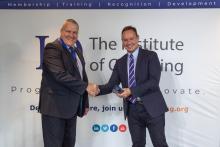
Martin Riley, senior VP of Tarmac, explains why we need a new careers language when it comes to developing skills of those working in the sustainable building materials sector.
“Our industry is undergoing a new era of skills development. Yet I suspect that skills and aspirational career opportunities might not be the first words that come to mind when people think of quarrying or construction.
From an insider’s perspective, I see the fantastic work that’s being done within our business and this sector to invest people as their most important asset.
When I participated in an
Helping all of our employees to develop their skills and stay motivated will only work if we can champion worker engagement. It’s key to boosting business productivity and embedding a zero harm safety culture too.
At
We’re actively supporting teams at our quarries to gain Technical Member Institute of Quarrying (TMIQ) status. It’s an important technical standard and more than just an accreditation title because it acknowledges the skills and professional expertise of many roles within the quarrying industry that were previously not formally recognised. Not only does this help to create a real sense of pride in peoples’ jobs, it also raises safety standards and makes colleagues more likely to remain committed to our industry in the long term.
Developing our employees and making the most of their transferable skills is only part of the solution to the industry skills shortfall. This investment in people will naturally support retention and advocacy. However, fundamentally, we – Tarmac and the wider industry – also need to do more to attract new talent.
And there is no doubt that our industry faces a challenge. The Construction Industry Training Board recently said that 232,000 extra people are needed to deliver the UK’s infrastructure plans for the next five years. That’s a huge hill to climb.
Recruiting this many people requires a fundamental rethink of how we position the sector, its career opportunities and long-term skills development it offers.
Attracting new entrants to the sector matters more than ever, due to the widespread recognition of the importance of construction and infrastructure to driving the UK economy. Delivering projects of all scales requires skilled people. We must convey this sense of excitement and opportunity – to ensure that current and future colleagues feel enthused and motivated about the careers and development that this industry offers.
Everyone in the sector has a real opportunity to shape the infrastructure of the future. We need people to be inspired by this idea of making their mark on UK infrastructure – so we get the right numbers of people, in the right place, with the right skills, at the right time. But how to do that when construction isn't necessarily viewed as an aspirational career choice by many young people?
Firstly, it’s about understanding what we can learn from other sectors as to language they use to position construction careers and bring new talent into our business.
Thinking beyond our own industry is critical; after all, this is who we’re competing with to attract the brightest and the best.
We’ve recently launched a careers campaign called ‘Make Your Mark’. It features real employees from Tarmac talking about their passion for the industry and their career journeys and progression. Rather than talking about the details of a job, they talk about their role in shaping the infrastructure of the future.
For instance, we focus on how our director of lime and powders is ensuring that people have access to fresh water and vital medicines. We show how a general manager from our contracting team is promoting pride in local communities. And we highlight how one of our project managers is reinventing the way we construct our infrastructure.
This isn’t hyperbole but an accurate reflection of my colleagues’ roles, focusing on the inspirational and playing to the heart as well as the head.
The skills shortfall figures that dominate the national debate are undoubtedly significant. Our industry has a responsibility to reposition its offer, think creatively and make construction a more aspirational career. But we must do this while nurturing our existing talent and championing better worker engagement too.”









